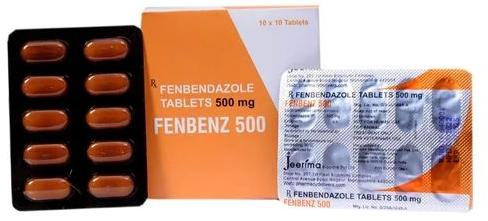Comprehending the Perks and Uses of Fenbendazole in Veterinary Medication
Fenbendazole has actually developed itself as a vital anthelmintic in vet medication. Its capacity to target various parasitical infections makes it a beneficial tool for veterinarians. The drug's mechanism interrupts vital cellular procedures in parasites, leading to effective therapy end results. Its safety and security profile varies in between species, demanding careful factor to consider in its usage (fenbendazole capsules). Comprehending these characteristics can clarify fenbendazole's broader ramifications in veterinary care and ongoing research study right into its prospective beyond traditional applications
System of Activity of Fenbendazole

Usual Parasitical Infections Treated With Fenbendazole
A range of parasitic infections are efficiently treated with fenbendazole, making it a versatile alternative in vet medication. This anthelmintic representative is specifically efficient versus nematodes, consisting of roundworms and hookworms, which commonly impact canines and cats. It is likewise utilized for the treatment of cestodes, such as tapeworms, providing a wide range of activity versus both sorts of intestinal tract parasites. In addition, fenbendazole is helpful in taking care of infections triggered by protozoa, especially Giardia, which can result in stomach distress in animals. Its effectiveness includes dealing with specific lungworms in dogs and felines, attending to respiratory system health issues linked to these parasites. Generally, fenbendazole's capability to target numerous parasitic types makes it an important tool in veterinary technique, making sure the health and wellness and health of family pets influenced by these common infections.
Security and Effectiveness in Different Pet Species
The safety and security and efficiency of fenbendazole differ among different pet varieties, highlighting the relevance of species-specific factors to consider in vet medicine. In canines, fenbendazole is usually well-tolerated and reliable versus a series of stomach bloodsuckers, including roundworms and hookworms. For felines, nevertheless, its use is much less typical and might call for mindful application as a result of potential adverse reactions.
In livestock, such as livestock and sheep, fenbendazole shows efficiency against numerous endoparasites, adding to improved health and wellness and productivity. The pharmacokinetics and possible side results can vary noticeably between species, necessitating careful evaluation by vets.
Equines likewise respond favorably to fenbendazole, specifically for dealing with strongyles and ascarids, though dose and management paths must be tailored to their unique physiology. Subsequently, understanding these distinctions is crucial for maximizing treatment outcomes and guaranteeing animal well-being across diverse types.
Administration and Dosage Guidelines
Proper administration and more info here dosage guidelines are crucial for making best use of the restorative effects of fenbendazole while minimizing possible adverse effects. The dose commonly varies relying on the species being dealt with, the particular problem, and the solution of fenbendazole made use of. fenbendazole capsules. For dogs and felines, a typical dosage is 50 mg/kg body weight, provided daily for 3 successive days, yet veterinarians may readjust this based upon specific wellness analyses
It is essential to administer fenbendazole with food to enhance absorption and reduce webpage stomach upset. The medication is readily available in different forms, including granules and paste, enabling versatile administration choices. Keeping an eye on the pet's reaction during and after treatment is advisable to verify efficacy and safety and security. Furthermore, veterinary guidance is vital to establish the suitable period of treatment based upon the kind of parasitic infection being resolved, assuring excellent outcomes for the pet's wellness.
Future Perspectives and Research Study on Fenbendazole
Research on fenbendazole remains to advance, concentrating on its potential applications past traditional antiparasitic usages. Recent studies have actually explored its performance in treating numerous forms of cancer cells, especially in vet oncology. Initial information recommend that fenbendazole might inhibit the growth of tumor cells and enhance the results of other chemotherapeutic representatives.
In addition, scientists are exploring its duty in managing intestinal disorders in animals, highlighting its anti-inflammatory properties. The adaptability of fenbendazole for various types elevates inquiries regarding its safety profiles and ideal application programs in varied populations.
As rate of interest grows, there is a need for thorough clinical trials to establish evidence-based guidelines review for these unique applications. Future study may additionally examine the systems behind fenbendazole's effects, possibly leading the method for cutting-edge therapeutic methods in vet medication. The ongoing expedition of fenbendazole might significantly boost treatment alternatives for numerous vet conditions.

Frequently Asked Inquiries
Is Fenbendazole Safe for Pregnant Animals?
The security of fenbendazole for expectant animals remains unsure. While some research studies suggest minimal risk, vets normally suggest caution and often discourage its usage during pregnancy unless the advantages plainly surpass potential dangers.
Can Fenbendazole Be Made Use Of in Animals?
Fenbendazole is generally utilized in animals to deal with different parasitic infections. fenbendazole. Its effectiveness against intestinal worms makes it a beneficial anthelmintic, adding to improved wellness and productivity in pets raised for food and fiber
What Are the Side Impacts of Fenbendazole?

The negative effects of fenbendazole may consist of gastrointestinal disruptions, lethargy, and allergies. In rare instances, much more serious responses can occur, necessitating cautious tracking and appointment with a vet during treatment.
Just How Does Fenbendazole Contrast to Various Other Dewormers?
Fenbendazole uses broad-spectrum effectiveness against various parasites, typically contrasting favorably to other dewormers. Its special device targets various life phases, making it efficient, while normally presenting a favorable safety account contrasted to options readily available on the market.
Can Fenbendazole Be Used for Dealing With Cancer in Pets?
The potential of fenbendazole in dealing with cancer in pet dogs has gathered passion. Preliminary research studies suggest it may inhibit cancer cells cell growth, however additionally research study is necessary to verify its efficacy and safety and security in veterinary oncology.